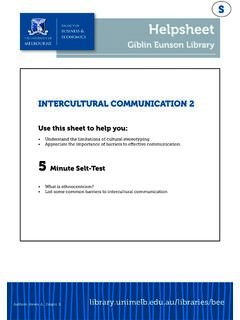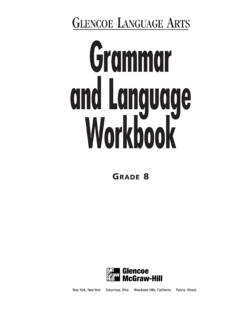Transcription of USING VOCABULARY IN BUSINESS AND ECONOMICS
1 VOCABULARY IN BUSINESSAND ECONOMICS5 minute self testBefore you read the Helpsheet, spend five minutes considering the following questions: How confident am I concerning the VOCABULARY I need for my studies in BUSINESS and ECONOMICS ? How important is it for me to expand my VOCABULARY for academic and professional contexts? What are some specific strategies that will help me develop my VOCABULARY ?Use this sheet to help you: Expand VOCABULARY relevant for your studies in BUSINESS and ECONOMICS Develop strategies for the continued development of your academic vocabularyWAuthors: Eggins, M., Beaumont, Eunson LibraryWUSING 1 USING VOCABULARY in BUSINESS and EconomicsAs a BUSINESS and ECONOMICS student, it is important you see yourself as a developing professional in your particular discipline.
2 In order to be such a professional, you need to sound and act like one a practitioner who can express themselves articulately to peers. Indeed, individual consultations have highlighted that students need to be more precise and accurate in their communication. For example, this means typically avoiding terms like some , recently and in the last few years and instead giving more exact information to help support your clear and appropriate VOCABULARY used in your practice now (be it your essays, reports, oral presentations and tutorials) and later in the workplace is vital in ensuring your ideas can be understood. Finding the VOCABULARY you needDon t just rely on what you already know for the VOCABULARY you use.
3 Instead, when given an assessment task, for example, carefully consider the discipline-specific VOCABULARY supplied in the question and assessment criteria. Use any of these terms that might be relevant if you are not sure of their meanings, ask your tutor or consult a dictionary. Other good VOCABULARY sources include course and subject outlines (including learning outcomes), set readings, textbooks (especially glossaries) and relevant websites, journals or other sources included on subject LMS specific BUSINESS and ECONOMICS vocabularyThe lists below are a good general starting point for building your BUSINESS and ECONOMICS VOCABULARY . Nouns:Nouns (general)acquisition goods merchandiserestructureagendagrowth mergerrisk brandincentivenichesegment commodity industryoutput services correction inventory projectionstockdeadline logisticsprospectusstrategy expansion manufacturing reporttargetWUSING 2 Nouns (related to people)agent competitorfranchiseerepresentativeassoci atecreditorlabor forceretailerboard member directormanagershareholderboard of directorsemployeepartnerspeculatorchairp ersonemployerpresidentstaffchief executive note that capital letters are used when you are referring to a specific position ( Mr John Smith, Chief Executive Officer of X )
4 But if the use is more general, capitalisation is not required ( many company directors are in favor of this change ).Nouns (related to money)Generally more neutral usageaccountinterestoutlaysalarybalancei nvestmentpayrollsecuritiesborrowinginvoi cepurchasespeculationbudgetmarginquotati ontakeovercapitalmarketreceipttransactio nfloatofferrefundvaluationOften used in a positive wayassetcommissionliquiditysalesbonusdiv idendprofitturnovercapitalequityrevenuey ieldOften used in a negative waybailoutdebtexpenseliquidationbankrupt cydeficitinsolvencylosscrashdepreciation liabilityoverheadNouns (related to places or organisations)agencyconglomeratefranchis eofficebranchcorporationheadquartersoutl etcarteldivisionmultinationalpoint of salecompanyfirmnetworkshop frontWUSING 3 Verbs: Rather than USING very general verbs such as be , do or have try to use more precise verbs where possible this will make your writing more specific, dynamic and credible.
5 For further illustration look at the two examples : Managers should have good communication version with more specific verb: Managers should communicate : The Account Manager said the payment was version with more specific verb: The Account Manager authorised the is a list of some more particular verbs:advertisedevelop investrecruitallocatedistributeinvoicere fundauthorisediversifymaintainreportcalc ulate employmanagerespondcompeteestablish negotiateruncontrolestimateproducestream linedelegatefundpromotesupplydeliverimpr ovepurchasetargetAdjectives and adverbs:Adjectives and adverbs can also help in giving more detail and thus give your readers and listeners a clearer picture.
6 Be especially careful to qualify relatively neutral words like effect . If you say for example X had an effect on Y that is not very useful. It is far better to give an indication of the size of the effect ( X had a significant effect on Y due or X significantly affected Y due ) and/or the nature of it ( X had a very beneficial effect on Y because ) along with supporting evidence. Here are some more examples: Adjective (opinion) + adjective (fact) + noundemonstrativeadjectiveadjectivenounT heseinnovativemarketing + adverb (opinion)noun(specific) VerbadverbThe 4 Adverb (opinion) + adjective (opinion)noun be list below has some useful adjectives.
7 Note that many of these can also be commonly used as adverbs or turned into adverbs (*).affordable*efficient*offshoreregiona l*annual*financial*operatingregulatoryco mmercial*fiscalprimary*retailcompetitive *fixedproductive*secondarycoreholistic* profitable*solventdepreciable* international*prosperous*strategic*domes tic*logistical*publicly*underperforminge conomic*nichequarterly*volatileWord families USING different word forms of a particular root word can also give your expression more variety:Noun VerbAdjectiveAdverbproduct, productionproduceproductive productivelycompetitor, competitioncompete (+ preposition)competitivecompetitivelyprof itprofit (+ preposition)profitable profitablyIf you are not sure of the spelling for a particular word form, consult a dictionary like Cambridge Advanced Learner s Dictionary which details various derivatives of a word under the Browse List a good VOCABULARY is not just about learning words in isolation.
8 Rather, think about groups of words that often go together in print and/or speech. These combinations, known as collocations, are well known and often used by native speakers. In contrast, other combinations may sound unnatural. Some examples below illustrate this: Natural expressionUnnatural expressionhuman resourcespeople resourcescustomer or client servicebuyer servicesales teamsales squadWUSING 5 Collocations can help your language sound more natural and understandable while also giving you alternative ways to express concepts. They can have a number of different grammatical nounsOne of the most common collocations is the compound noun (adjective and noun or noun and noun) where single words join others to make a more specific meaning.
9 Sometimes these may be combined to make just one word as in trademark or output while in other cases they may be two (or even more) as in stock market or close economic ties . In addition, a word like buyback is usually collocated with share ( share buyback ). Once it is clear, you can just use the key word rather than the one that modifies it as in:The brand loyalty of consumers to product X is strong. This loyalty has been reflected in last month s strong sales figures. Below is a table of some examples of common compound nouns in BUSINESS :brand loyaltyfixed assetsnet profitcash flowfocus groupniche marketingclose economic ties joint ventureraw materialscorporate governancelisted companyshare tradingdistribution channelmarket positionsupply chainOther kinds of collocationsCollocations can also be formed in other combinations including: Adverb + adjective: The new sales strategy represents a clear attempt to remain internationally competitive in the marketplace.
10 Noun + verb + adverb: Markets reacted strongly to the profit forecast. Verb + noun: The subsidiary generated substantial profits from its mining exploration lease. Phrasal verb (verb + preposition): The company was negotiating with a supplier. More complex noun group (includes a noun with a preposition)Improvements in productivity have lifted the company s bottom line. WUSING 6 Learning more collocationsTo help learn collocations try to recognise them when you hear (and particularly read) them. When you learn a new word too, write down some collocations for it ( if the word is brand you could also note brand identification and brand loyalty ).






